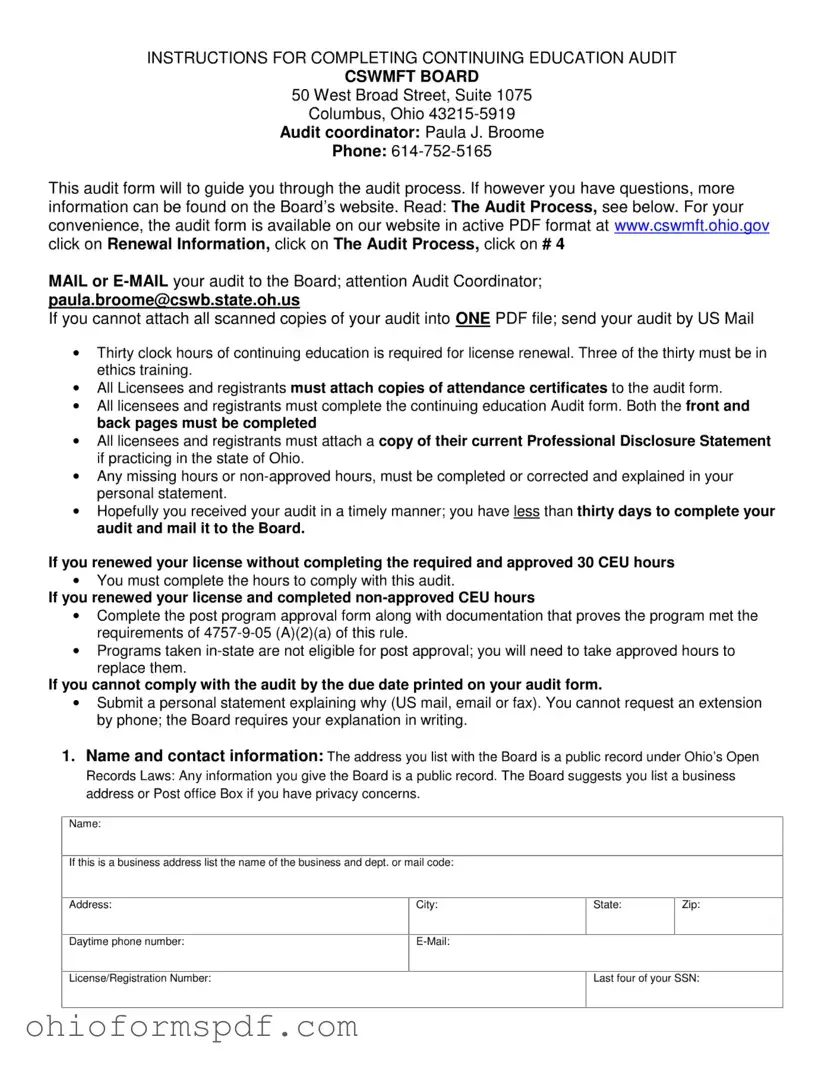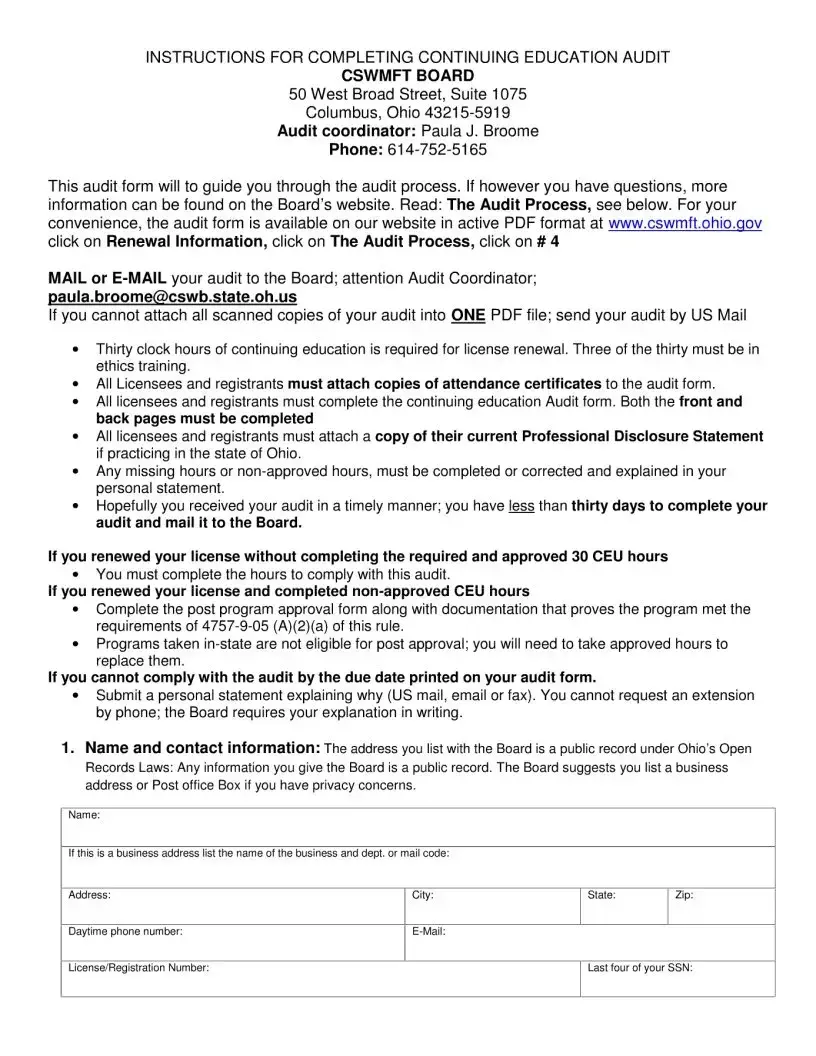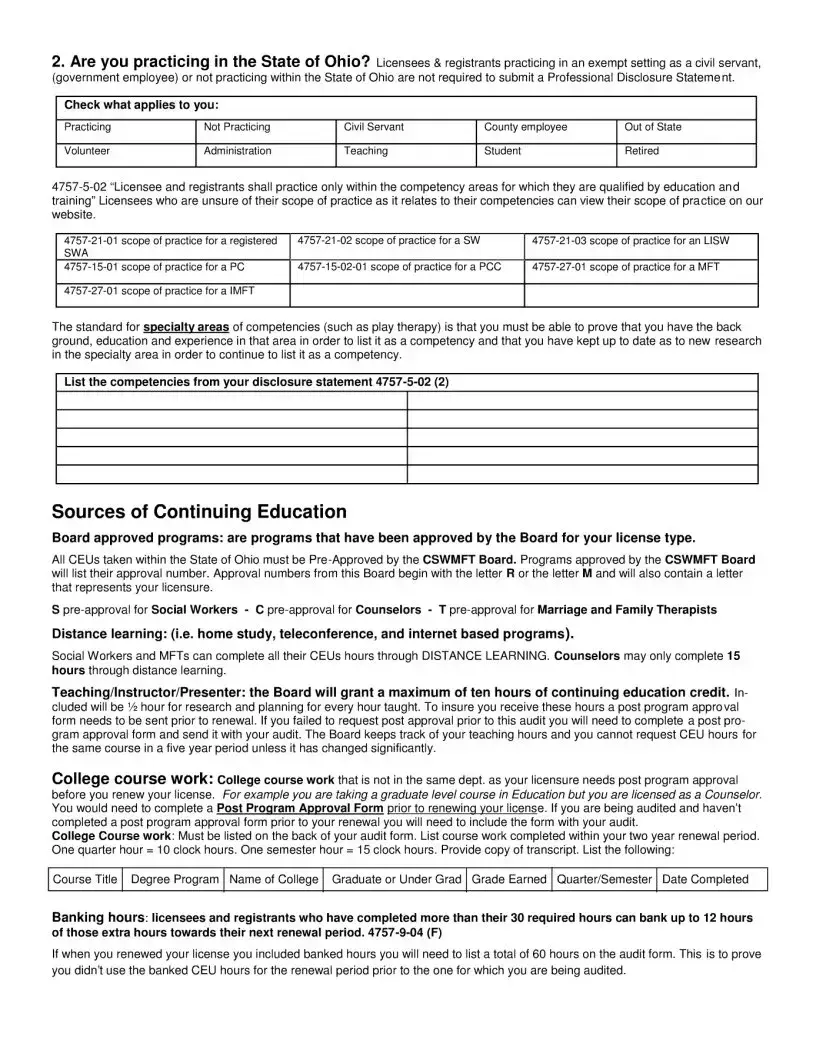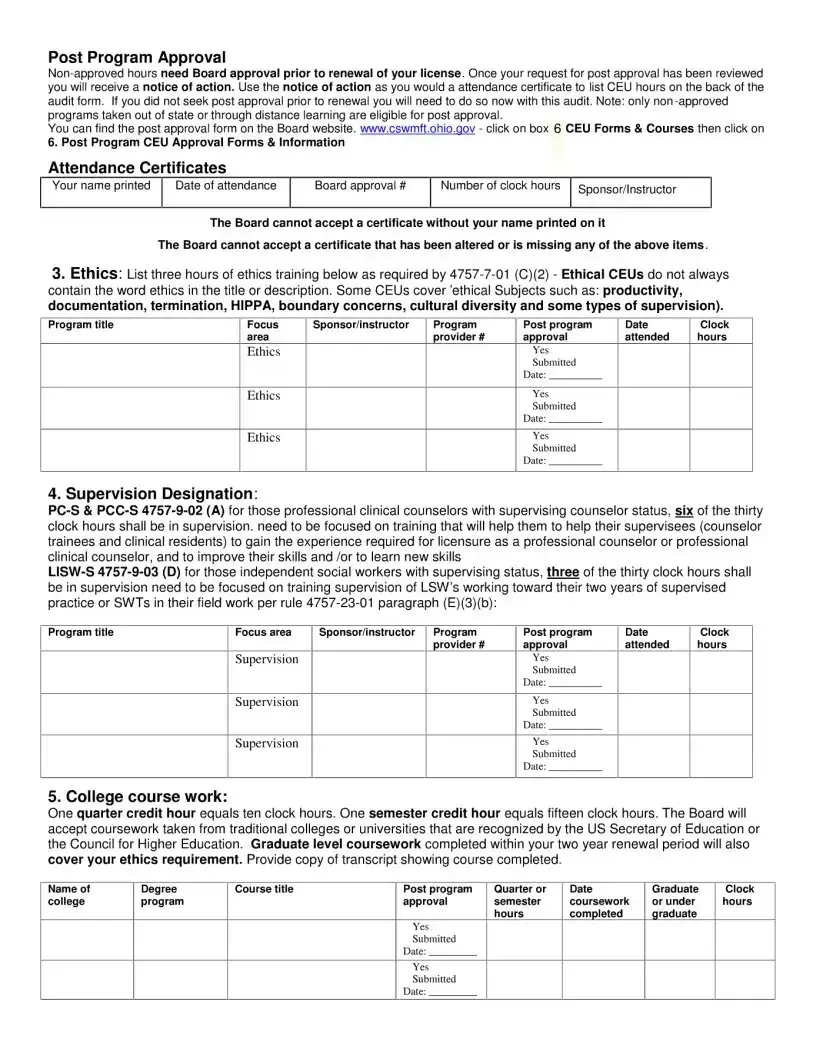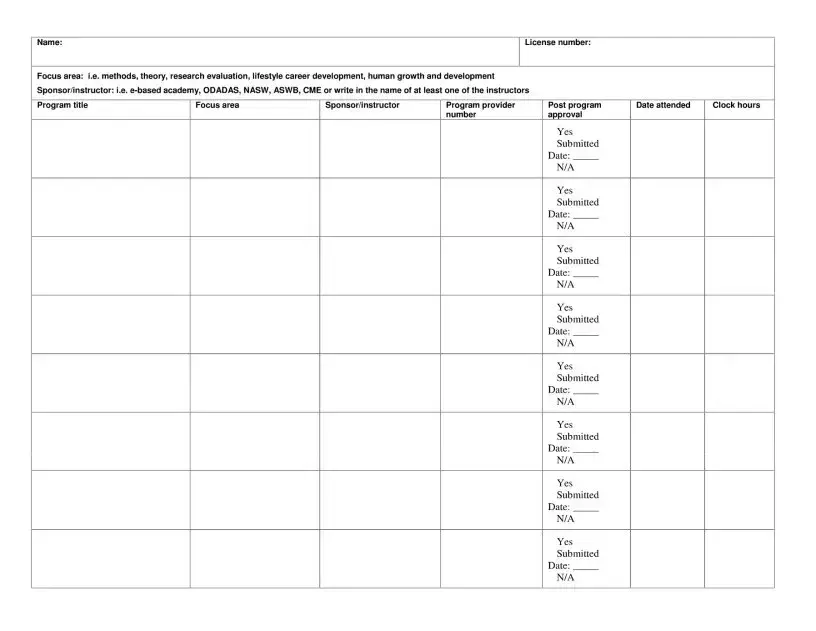| Additional Requirements |
Applicants must meet educational, exam, and experience requirements specific to their profession, which are detailed in the accompanying instruction
Detailed Instructions for Using Cswmft Ohio Gov
Filling out forms can be an intricate process, particularly when it concerns professional licensing and certifications. The CSWMFT Ohio Gov form is a crucial step for those looking to establish themselves in counseling, social work, or marriage and family therapy within Ohio. It’s a vital piece of documentation that requires attention to detail and accurate information. Completing this form correctly is the first stride towards achieving professional recognition, laying the groundwork for your practice in the state. Following the steps below will guide you through the process, ensuring your application is filled out correctly and efficiently.
- Start by entering your professional identification information. This includes your full name, mailing address, and contact details such as phone number and email address. Ensure the information is current and accurate.
- Detail your educational background. List all relevant degrees and certifications that pertain to counseling, social work, or marriage and family therapy. Include the institution names, the year of graduation, and the degree or certification obtained.
- Include your work experience relevant to the field. This should cover your roles, the organizations you worked with, the duration of your employment, and a brief description of your responsibilities and achievements. This information showcases your practical experience and suitability for certification.
- Answer questions related to your professional conduct. This section requires you to provide information on any disciplinary actions, criminal convictions, or ethical breaches in your professional history. Honesty in these answers is critical for the integrity of your application.
- Add details of any professional licenses you currently hold or have held in the past, including the license numbers and the states in which you were licensed. This information is necessary for verifying your standing in other jurisdictions.
- Review your application thoroughly. Before submitting, double-check each section for accuracy and completeness. Mistakes or omissions can lead to delays or rejection of your application.
- Finally, sign and date the form. Your signature attests to the truthfulness of the information provided and your compliance with the application requirements.
Once your application is submitted, it passes through a review process. The board evaluates it to ensure all required information is present and meets the state’s standards for professional practice. Approval of your application will mark a significant milestone, ushering you into the community of licensed professionals in Ohio. Keep an eye on your provided contact information for any communications from the board regarding the status of your application or any additional information they may require.
What You Should Know About Cswmft Ohio Gov
What is the CSWMFT Ohio Gov form?
The CSWMFT Ohio Gov form is an official document used by the Counselor, Social Worker, and Marriage & Family Therapist Board of Ohio. It is designed for various purposes including applications for licensure, renewal of licenses, and continuing education submissions, among others. This form is a crucial step for professionals in these fields who are looking to practice legally within the state of Ohio.
How can I obtain the CSWMFT Ohio Gov form?
The form can be accessed by visiting the official website of the Counselor, Social Worker, and Marriage & Family Therapist Board of Ohio. Here, individuals can find the most current versions of the form available for download in a printable format. Additionally, some processes may allow for electronic submission, in which case instructions for online completion and submission would also be provided on the website.
What information do I need to provide when completing the CSWMFT Ohio Gov form?
While the specific information required can vary depending on the precise use of the form, generally, applicants will need to provide personal information such as their full name, address, and contact details. Professional details, including educational qualifications, licensure history, and work experience, may also be required. Furthermore, for certain submissions like license renewals, proof of completed continuing education credits is often necessary. It is important to carefully review the specific requirements for the intended purpose of the form before filling it out.
Are there any fees associated with submitting the CSWMFT Ohio Gov form?
Yes, there are fees associated with many of the actions requiring the submission of the CSWMFT Ohio Gov form. The amount of the fee can vary depending on the nature of the submission, such as licensure application, renewal, or other professional approvals. All fee details, including the method of payment accepted, are typically outlined within the instructions of the form or on the board's official website. Applicants are advised to review these details thoroughly to ensure correct payment and avoid processing delays.
Common mistakes
-
Not checking the latest form version. The Ohio Counselor, Social Worker, and Marriage & Family Therapist Board often updates its forms to reflect changes in regulations or procedures. Filling out an outdated form can delay the application process.
-
Overlooking required fields. Many people skip sections that don’t seem applicable at first glance. However, every field in the CSWMFT form is there for a reason. If a section truly doesn’t apply, it’s usually better to write “N/A” than to leave it blank.
-
Entering incorrect information. Errors, especially in key details like license numbers or contact information, can significantly hold up the process. It's important to double-check all entries for accuracy.
-
Forgetting to sign and date the form. An unsigned or undated form is considered incomplete. Electronic submissions require a digital signature, so be sure not to overlook this step.
-
Not attaching required documents. Many applications require supplemental documents, such as transcripts or verification of licensure from other states. Missing documents can result in processing delays.
-
Misunderstanding the instructions. Read through the form instructions carefully. Misinterpreting the requirements can lead to incorrectly filled forms. If in doubt, it's wise to reach out to the board directly for clarification.
-
Waiting until the last minute to submit. Procrastination can be a significant setback. Processing times can vary, and waiting too long to submit your application may delay your licensure, potentially affecting your employment.
In addition to these common mistakes, it's useful to keep a few general tips in mind:
- Print clearly and legibly. If the form is not typed, ensure that handwriting is neat and readable to avoid any confusion.
- Keep copies of everything you submit. Having your own records can be crucial if there are any questions or issues with your application.
- Use the CSWMFT Board's official website for the most current versions of forms and information. This ensures that you have the latest updates and guidance.
Documents used along the form
In the legal and professional world, the completion and submission of specific forms and documents are critical, especially for those in the counseling, social work, marriage and family therapy professions in Ohio. The CSWMFT Ohio Gov form is a pivotal document for professionals in these fields, serving as a primary application or verification tool. However, this form often requires the submission of additional documents to ensure compliance with state regulations and professional standards. Understanding these supplementary documents can facilitate the application process, ensuring a smoother, more efficient workflow.
- Professional Resume/CV: This document outlines an applicant's professional history, including education, relevant work experience, and accomplishments. It provides the board with a comprehensive overview of the applicant's qualifications.
- Supervised Experience Verification: For licensure, applicants are required to prove that they have completed a certain number of hours under professional supervision. This document verifies that the supervision occurred, detailing the nature and duration of the experience.
- Background Check Authorization: This form allows the board to conduct a criminal background check, a necessary step for ensuring the safety and reliability of licensed professionals.
- Official Transcripts: Submitting transcripts from accredited institutions confirms the applicant's educational background, proving that they have met the academic requirements for licensure.
- Professional References: References from colleagues or supervisors can attest to an applicant's skills, work ethic, and suitability for licensure.
- Proof of Legal Residency: Applicants may need to provide documentation that establishes their legal right to work in the United States, such as a passport or green card.
- Continuing Education Certificates: These certificates prove that the applicant has engaged in ongoing professional development, a requirement for renewal of licensure.
- Licensure Examination Scores: Applicants must pass relevant exams to demonstrate their competence in their profession. This document reflects the scores achieved on such exams.
Together, the CSWMFT Ohio Gov form and these accompanying documents play a crucial role in the licensing process for professionals in counseling, social work, marriage, and family therapy in Ohio. By preparing and submitting these documents as required, applicants can streamline their path to licensure, contributing to their professional advancement and ensuring adherence to the highest standards of practice within their fields.
Similar forms
The CSWMFT Ohio Gov form is akin to the Professional License Application forms used across various states for different professions. These documents serve a similar purpose: to ensure that individuals meet specific requirements before they can legally offer their services in professions like counseling, social work, marriage and family therapy, and others. They typically require detailed information about an applicant's education, experience, and sometimes, even moral character. By standardizing the process through such forms, states strive to protect the public by ensuring that only qualified individuals provide professional services.
Another document that shares similarities with the CSWMFT Ohio Gov form is the Continuing Education (CE) Approval forms. Professionals in fields like therapy, social work, and healthcare are often required to complete ongoing education to maintain their licenses. These CE forms are integral in tracking that such professionals meet their educational requirements, ensuring they stay updated with the latest practices and knowledge in their field. While the CSWMFT form focuses on initial licensure or renewal, CE forms emphasize maintaining and enhancing competency post-licensure.
Background Check Authorization forms are also comparable to the CSWMFT Ohio Gov form, albeit focusing on a different aspect of professional qualification. While the CSWMFT form assesses an individual's qualifications and eligibility to practice in a regulated profession, Background Check Authorization forms evaluate the suitability of a person based on their criminal history or lack thereof. This is pivotal in professions that require a high degree of trust and ethical standards, aiming to protect public welfare and safety by preventing individuals with problematic histories from obtaining licensure.
Lastly, the Ethics Declaration or Professional Conduct Statement forms bear resemblance to the CSWMFT Ohio Gov document. These forms require applicants to affirm their understanding and willingness to adhere to established professional ethical standards. The emphasis here is on ensuring that professionals commit to acting with integrity and responsibility in their practice. Similar to the CSWMFT form, which may include attestations regarding adherence to ethical codes, these declarations are crucial in fostering trust between the public and those in the profession, reinforcing the commitment to ethical practice.
Dos and Don'ts
When filling out the form on Cswmft Ohio Gov, it's important to pay close attention to detail and follow instructions thoroughly. To help guide you through this process, here are critical dos and don'ts to keep in mind:
- Do review the entire form before you start to fill it out. This ensures you have all necessary information on hand.
- Do use a black ink pen if you're filling out the form by hand, as this is standard for official documents.
- Do provide accurate and up-to-date information. Inaccuracies can delay processing or lead to denial.
- Do double-check your work for spelling and grammar mistakes. Errors can create misunderstandings or misinterpretations.
- Do keep a copy of the completed form for your records. Having this can be critical for future reference and follow-up.
- Don't leave mandatory fields blank. If a question doesn't apply, write "N/A" (Not Applicable) instead of leaving it empty.
- Don't use shortcuts or abbreviations unless they are officially recognized and accepted on the form.
- Don't submit the form without first reviewing it for completeness and accuracy. Missing or incorrect information can result in delays or rejections.
Adhering strictly to these guidelines will streamline the process of filling out the form on Cswmft Ohio Gov and increase the likelihood of a favorable outcome. Patience and attention to detail are your best tools in this endeavor.
Misconceptions
In navigating through the complexities of the Cswmft Ohio Gov form, individuals frequently encounter a number of misconceptions. Addressing these misunderstandings is crucial for those seeking licenses in counseling, social work, and marriage and family therapy in Ohio. Here are eight common misconceptions and the truths behind them:
It's just a formality. Many believe that completing the Cswmft Ohio Gov form is merely a procedural step. In reality, the form is a vital part of the process that assesses eligibility and qualifications for licenses. Each question is designed to gather necessary information to safeguard public welfare. Educational qualifications from any institution are acceptable. Contrary to what some might think, the board only accepts degrees from accredited programs that meet specific educational standards. Verification of educational background is stringent to ensure candidates have received proper training. Experience gained in any setting counts towards licensing. Ohio has clear guidelines about the nature of pre-licensing experience. Experience must be in specific settings under qualified supervision. It’s incorrect to assume that all types of experience will fulfill the requirements. Once submitted, the application process is out of my hands. This is not entirely true. Applicants must be proactive in following up on their application, ensuring all documents are received and properly processed. Regular communication with the board can help expedite the process. Fees are one-time and cover all aspects of licensing. In the process of obtaining a license, multiple fees may be involved, including application fees, examination fees, and renewal fees. It's important to be aware of all possible charges throughout the journey. Passing the required exam guarantees a license. While passing the relevant examination is a critical step, it does not automatically grant a license. Applicants must also meet other requirements such as background checks and supervised experience. The form can be submitted without a Social Security number. For most applicants, a Social Security number is an essential piece of information that must be provided. It plays a crucial role in identity verification and background checks. Once licensed, the process is over. Obtaining the license is a significant milestone, but maintaining it requires continuous professional development and adherence to ethical standards. Licensees must undertake ongoing education and renew their licenses periodically to remain in good standing.
It is imperative for applicants and licensees to approach the Cswmft Ohio Gov form and the licensing process with diligence and attention to detail. Misunderstandings can lead to delays or even the denial of licensure. Therefore, clarifying these misconceptions is key to navigating the process more effectively and ultimately achieving professional licensure in the fields of counseling, social work, and marriage and family therapy.
Key takeaways
When approaching the task of filling out the CSWMFT (Counselor, Social Worker, & Marriage and Family Therapist) Ohio Gov form, several key points should be kept in mind to ensure the process is completed correctly and efficiently. Doing so not only aids in a smoother application process but also supports applicants in understanding how this form plays a crucial role in their professional endeavors within Ohio.
- Accuracy is paramount: Ensure all information provided on the form is accurate and up-to-date. This includes personal details, educational background, and any professional experience related to the field. Mistakes or discrepancies in the provided information can lead to delays in processing or even the outright rejection of the application.
- Follow instructions carefully: The form comes with specific instructions that are designed to guide applicants through each step of the completion process. It’s important to read these instructions thoroughly before starting and to refer back to them as needed to avoid common mistakes.
- Professional licensure requirements: The CSWMFT Ohio Gov form is a critical step in obtaining professional licensure in Ohio for counselors, social workers, and marriage and family therapists. Familiarize yourself with the specific licensure requirements for your profession, as the form may ask for information or documentation to demonstrate that these requirements have been met.
- Supporting documents: In many cases, applicants will need to submit additional documents along with the completed form. This may include transcripts, proof of supervised professional experience, and/or results from relevant examinations. It’s essential to know what documents are required and to ensure they are prepared and submitted according to the guidelines provided.
- Submission and follow-up: Pay close attention to the submission guidelines, including where and how to submit the form. Once the form and any accompanying documents have been submitted, keep a copy of everything for your records. Be prepared to follow up on the status of your application, especially if you do not receive acknowledgment of receipt or if there are any questions about your submission.
Completing the CSWMFT Ohio Gov form is a significant step toward licensing for many professionals in the counseling, social work, and marriage and family therapy fields within Ohio. Approaching this task with diligence, attention to detail, and an understanding of its importance will help ensure a smooth application process and contribute to a successful start or continuation of a professional career in these vital healthcare services.
Please rate Blank Cswmft Ohio Gov Template Form
4.72
Incredible
189 Votes
Common PDF Documents
What Is Cat Tax
- Emphasizes the importance of accurate and truthful reporting as declared under penalties of perjury by the responsible officer.
Ohio Bwc Drug Free Safety Program
- Designed to integrate seamlessly with the Safety Management Self-Assessment, complementing overall safety strategy.
|
